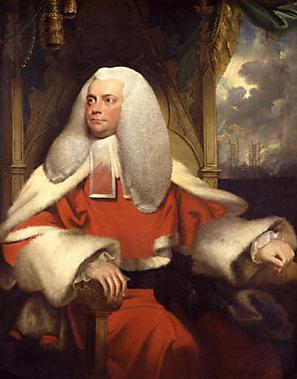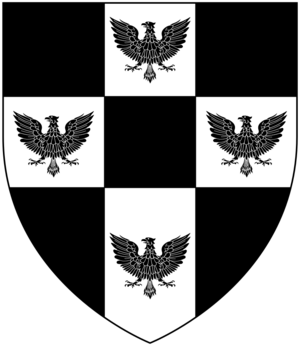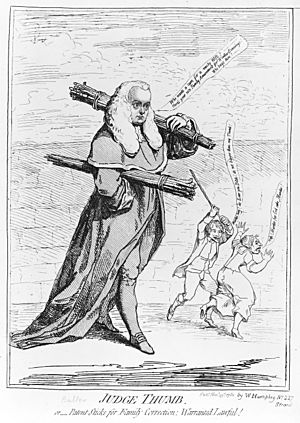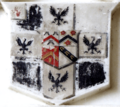Sir Francis Buller, 1st Baronet facts for kids
Quick facts for kids
Sir Francis Buller
|
|
|---|---|
 |
|
| King's Bench | |
| In office 6 May 1778 – 19 June 1794 |
|
| Succeeded by | Sir Francis Buller-Yarde-Buller, 2nd Baronet |
| Personal details | |
| Born | 17 March 1746 Devon, England |
| Died | 5 June 1800 (aged 54) London, England |
| Education | King's School Ottery St. Mary Christ's Hospital, London. |
| Occupation | Judge |
Sir Francis Buller, 1st Baronet (born March 17, 1746 – died June 5, 1800) was an important English judge. He was known for his quick rise in the legal world and his work on some major cases.
Contents
Early Life and Family
Sir Francis Buller was born at Downes House in Devon, England. He was a younger son in a large family. His father, James Buller, was a Member of Parliament. Since his older brothers would inherit the family's main properties, Francis had to make his own way. He became successful through his legal career and by marrying a wealthy heiress.
A Judge's Journey
Becoming a Lawyer
Francis Buller went to school at The King's School in Ottery St Mary and Christ's Hospital in London. In 1763, he began studying law at the Inner Temple. He quickly became a skilled lawyer. By 1772, he was officially allowed to practice law. Just five years later, in 1777, he became a King's Counsel, which is a very high rank for a lawyer.
Rising to the Bench
In 1777, Buller was appointed a judge in Chester. Then, on May 6, 1778, at only 32 years old, he became a judge in the King's Bench court. This was a very fast promotion for someone so young.
Important Cases and Challenges
Buller was involved in several important legal cases. In 1783, he was one of the judges in the appeal of the Zong case. This was a significant legal challenge about insurance claims related to a ship.
He also oversaw a major trial in 1785. This case was about whether a patent held by Richard Arkwright, a famous cotton manufacturer, was valid. The jury decided that Arkwright's patent was not valid. This was because the instructions for his invention were unclear. Also, some of the inventions he claimed were actually made by others. Even though he lost the patent battle, Arkwright continued to be very successful with his cotton spinning mills.
Leading the Court
For a few years, when Lord Mansfield, the chief judge, was ill, Buller effectively led the King's Bench court. Many people thought Buller was the better lawyer. However, when Lord Mansfield died, William Pitt the Younger, the Prime Minister, chose someone else to be the chief judge.
Even so, Buller was recognized for his skills. On January 13, 1790, he was made a Baronet. This is a special title that can be passed down in a family. In 1794, he moved to another important court, the Court of Common Pleas.
Improving the Land
Prince Hall Estate
Around 1790, Sir Francis Buller bought a property called Prince Hall on Dartmoor, in Devon. He greatly expanded the buildings there, making them very grand. He was kind to his tenants and workers, even inviting them to religious services at Prince Hall.
Farming on Dartmoor
Buller also fenced off about 2,000 acres of land around Prince Hall. He wanted to improve the land for farming. At the time, many people believed that Dartmoor's poor soil could be made better for growing crops.
He tried to make the soil more fertile and improve the types of sheep and cattle. He also planted many trees, though most of them did not survive. However, a beautiful avenue of trees leading to Prince Hall still stands today. Buller also bought other estates on Dartmoor and built an inn called the Saracen's Head.
Family Life
In 1763, when he was 17, Francis Buller married Susanna Yarde. She was a wealthy heiress. Through her, he gained the Churston Court estate. Later, he bought Lupton House, which became his main home.
Sir Francis and Susanna had children, including:
- Edward Buller, their first son, who died before his father.
- Sir Francis Buller-Yarde-Buller, 2nd Baronet, who inherited his father's title. His descendants include:
- John Yarde-Buller, 1st Baron Churston.
- Sir Edward Manningham-Buller, 1st Baronet, whose family later received the title Viscount Dilhorne.
Later Life and Legacy
Sir Francis Buller's health declined in the late 1790s. He suffered from gout and other illnesses. He passed away on June 5, 1800, in London. He was buried in the churchyard of St Andrew's Church in London, next to his first son, Edward.
A monument to Sir Francis Buller can be found in St Mary's Church in Brixham, Devon. It describes him as a memorable man who was sharp, diligent, and skillful in understanding and interpreting the law.
Images for kids
 | James B. Knighten |
 | Azellia White |
 | Willa Brown |






